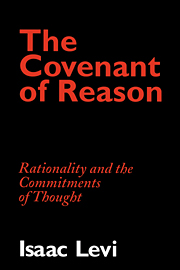Book contents
- Frontmatter
- Contents
- Introduction
- 1 Rationality and commitment
- 2 Rationality, prediction, and autonomous choice
- 3 The logic of full belief
- 4 Consequentialism and sequential choice
- 5 Prediction, deliberation, and correlated equilibrium
- 6 On indeterminate probabilities
- 7 Consensus as shared agreement and outcome of inquiry
- 8 Compromising Bayesianism: A plea for indeterminacy
- 9 Pareto unanimity and consensus
- 10 The paradoxes of Allais and Ellsberg
- 11 Conflict and inquiry
- 12 The ethics of controversy
- Name Index
- Subject Index
11 - Conflict and inquiry
Published online by Cambridge University Press: 05 June 2012
- Frontmatter
- Contents
- Introduction
- 1 Rationality and commitment
- 2 Rationality, prediction, and autonomous choice
- 3 The logic of full belief
- 4 Consequentialism and sequential choice
- 5 Prediction, deliberation, and correlated equilibrium
- 6 On indeterminate probabilities
- 7 Consensus as shared agreement and outcome of inquiry
- 8 Compromising Bayesianism: A plea for indeterminacy
- 9 Pareto unanimity and consensus
- 10 The paradoxes of Allais and Ellsberg
- 11 Conflict and inquiry
- 12 The ethics of controversy
- Name Index
- Subject Index
Summary
“Give a dog a bad name and hang him.” Human nature has been the dog of the professional moralists and consequences accord with the proverb.
Thus, John Dewey begins his Human Nature and Conduct. The theme Dewey means to press is familiar enough in his work. Morality seeks to control human nature which resists regulation and so comes to be regarded as a source of evil to be mastered. But given the intractability of human nature, pressure builds to identify some aspect of human nature which is subject to moral control. Dewey writes: “The severance of morals from human nature ends by driving morals inwards from the public open out-of-doors air and light of day into the obscurities and privacies of an inner life. The significance of the traditional discussion of free will is that it reflects precisely a separation of moral activity from nature and the public life of men.”
Dewey sought to draw the contrast between the moral and the nonmoral in a way which avoids “the severance of morals from human nature.” He granted that morality is concerned with the regulation of human conduct. Perhaps it would be better to say that Dewey granted that moral questions are questions concerning human conduct, for, on his view, the notion of there being a morality consisting of a system of normative principles which are distinctively moral is part and parcel of the severance of morals from human nature he sought to avoid.
- Type
- Chapter
- Information
- The Covenant of ReasonRationality and the Commitments of Thought, pp. 217 - 238Publisher: Cambridge University PressPrint publication year: 1997



